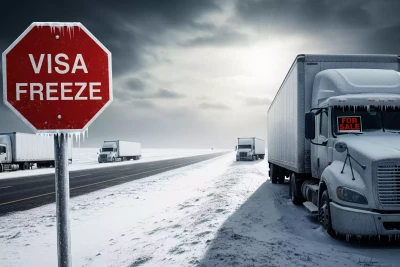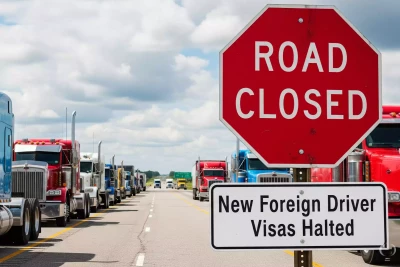What the Trump Administration’s Pause on Commercial Trucking Visas Means for the Transport Economy
August 26, 2025
 In a move that could have major implications for the U.S. transportation and logistics sector, the Trump administration announced a freeze on all new work visas for commercial truck drivers late last week.
In a move that could have major implications for the U.S. transportation and logistics sector, the Trump administration announced a freeze on all new work visas for commercial truck drivers late last week.
The decision appears to have been influenced by a recent fatal semi-truck crash in Florida that claimed three lives. In response, Department of Transportation Secretary Sean Duffy confirmed Tuesday that the Federal Motor Carrier Safety Administration (FMCSA) has launched an investigation into both the driver and the carrier involved.
This policy shift also comes amid a renewed emphasis on enforcement of English-language proficiency standards for commercial drivers. Federal regulations require drivers to be able to read and speak English well enough to converse with the general public, understand highway traffic signs, respond to official inquiries, and complete reports.
Secretary of State Marco Rubio explained the decision to halt new trucking visas in a statement posted to X (formerly Twitter), writing, “The increasing number of foreign drivers operating large tractor-trailer trucks on U.S. roads is endangering American lives and undercutting the livelihoods of American truckers.”
Under current regulations, foreign drivers are able to obtain a U.S. commercial driver’s license, but they must also hold a valid employment authorization document. Two primary visa categories have historically supported this process:
- H-2B Visa: A temporary visa that allows U.S. companies to hire foreign workers for seasonal, temporary, or non-agricultural jobs. Typically valid for up to nine months, these visas require employers to demonstrate a shortage of available U.S. workers before approval.
- EB-3 Visa: A more permanent option that enables companies to sponsor foreign drivers for long-term employment. EB-3 visas provide a pathway to permanent residency, with the green card valid for 10 years.
Both of these visa options are now effectively frozen for commercial drivers under the administration’s new directive.
The pause raises serious questions about how the trucking industry will meet demand amid an ongoing driver shortage. For years, carriers have relied on both temporary and permanent foreign labor to help fill critical gaps in the workforce. With this sudden policy shift, many logistics companies could face new challenges in maintaining service levels, meeting delivery schedules, and supporting supply chain reliability.
 It remains unclear how long the pause will last, or whether additional restrictions may follow. For now, trucking companies are bracing for potential disruptions while awaiting further guidance from federal agencies.
It remains unclear how long the pause will last, or whether additional restrictions may follow. For now, trucking companies are bracing for potential disruptions while awaiting further guidance from federal agencies.
While changes in labor policy may disrupt parts of the trucking workforce, businesses don’t have to navigate these uncertainties alone. Triple T Transport’s industry-leading 3PL services provide access to a wide carrier network, flexible transportation solutions, and expert guidance to keep freight moving regardless of market challenges. By partnering with Triple T, shippers can minimize disruption, maintain delivery schedules, and strengthen supply chain resilience during periods of uncertainty.
Triple T Transport will continue monitoring these developments closely and provide updates as new information becomes available.














